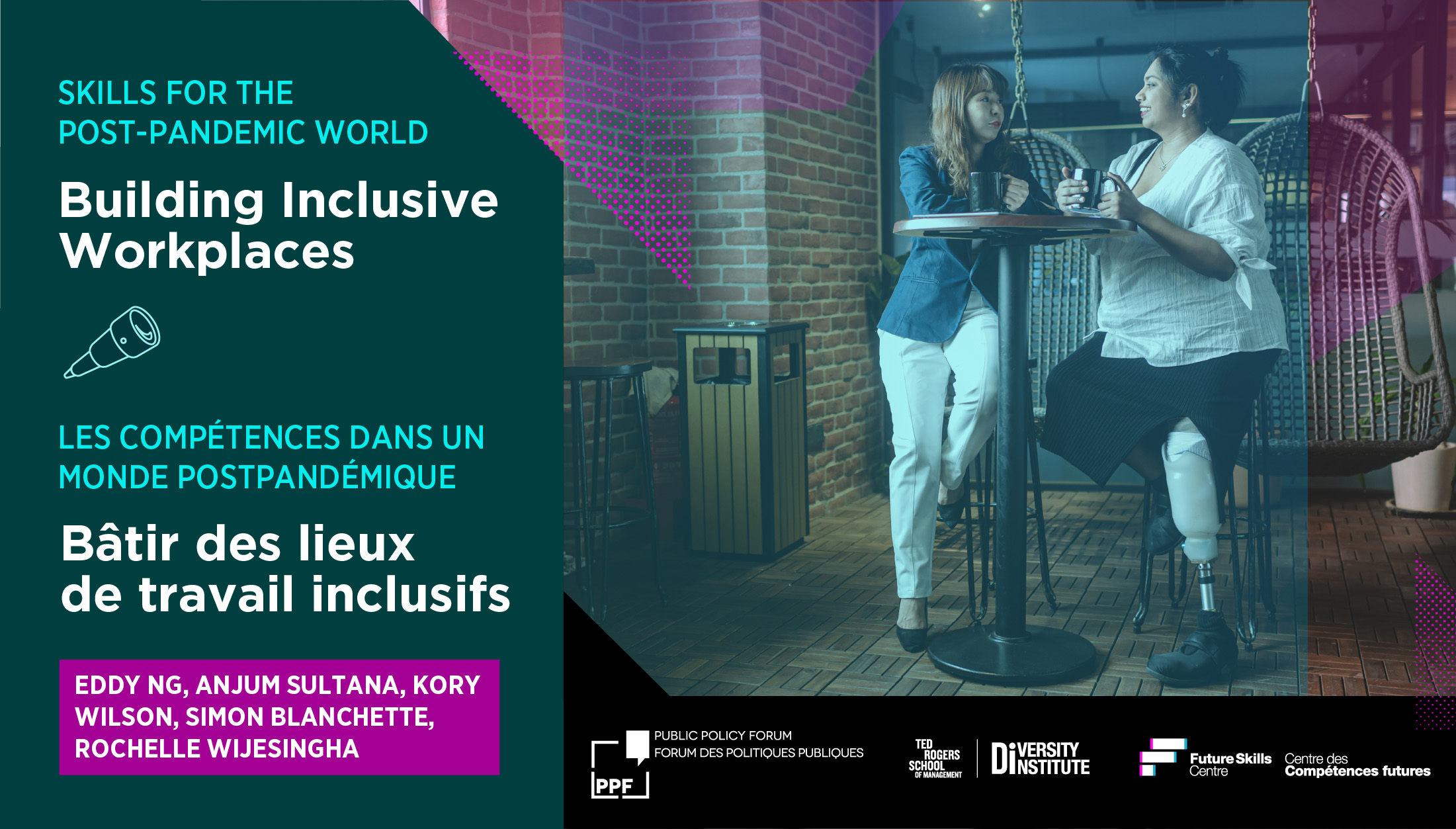Building Inclusive Workplaces

The impacts of the COVID-19 pandemic have not been equally felt in Canada. Many members of equity-seeking groups have been disproportionately affected—particularly women, Indigenous peoples, racialized people, young people and persons with disabilities.
Responses to the pandemic have also had uneven impacts, deeply affecting access and participation in education and training opportunities for many members of these same groups.
Building Inclusive Workplaces, a new report in the Skills for the Post-Pandemic World series, takes an in-depth look at how businesses, government and employees themselves can develop an inclusive skills and employment ecosystem that leaves no one behind.
The report is written by Eddy Ng (external link) (James & Elizabeth Freeman Professor of Management at Bucknell University), Anjum Sultana (external link) (National Director of Public Policy & Strategic Communications at YWCA Canada), Kory Wilson (external link) (Executive Director of Indigenous Initiatives and Partnerships for British Columbia Institute of Technology), Simon Blanchette (Research Associate at the Diversity Institute), and Rochelle Wijesingha (external link) (Senior Research Associate at the Diversity Institute).
“While retraining and upskilling will be crucial, systemic barriers may prevent skills from being gained or effectively utilized, and program and policy experts aiming to move the needle need to take these factors into account,” they suggest.
The authors find that several factors contribute to the disproportionate impacts of the COVID-19 pandemic felt by many in equity-seeking groups. For example, these groups are overrepresented in sectors that have been hardest hit by the pandemic, like hospitality and retail, and less present in sectors and industries that have been more able to adapt and grow in the face of COVID-19. At the same time, women, immigrants, Indigenous peoples and racialized workers, as well as youth, are overrepresented in industries that are unable to transition to telework, leaving them more vulnerable to the virus. For those who can work from home, many may not have the capacity to do so due to increased family life demands and inequitable access to the resources and infrastructure they need.
Prior to the spread of the virus, youth from equity-seeking communities already faced challenges relating to skills, especially digital skills. Without equitable access to quality infrastructure and support for online learning, the skills gap is only becoming harder to cross. The cancellation and delays of Work Integrated Learning (WIL) programs, especially for those who relied on work placements for part-time income or as part of their program requirements, can also significantly delay crucial skills development for young workers and lead to negative long-term impacts on their careers.
A combination of efforts from governments, employers, service providers, and workers engaged in the skills ecosystem are needed to address these challenges and foster diverse and inclusive workplaces. The report underlines the pressing need for greater access to digital skills and digital infrastructure, renewed commitments to essential skills, and new management and leadership skills for new working arrangements.
The skills to build capacity for diversity and inclusion are also critical. The authors see recruitment processes as one significant area of concern. They ask firms to critically examine whether their hiring practices actually match their skills needs, to start recruiting in previously unexplored places, and to create a more diverse pipeline of candidates by decreasing their implicit, and inefficiency-generating, biases.
“The recovery from COVID-19 represents a great opportunity to “build back better” and more inclusively by addressing barriers that not only existed before the pandemic but which have been exacerbated and made even more salient by it. Ensuring equitable access is critical, and fundamental investments in infrastructures such as broadband internet, childcare and social supports are essential to levelling the playing field.”
Skills for the Post-Pandemic World

The Skills for the Post-Pandemic World (opens in new window) project tackles key questions facing policymakers, employers, training providers and workers. It is urgent that society turn to face the fundamental changes in the labour market precipitated by the COVID-19 pandemic, and many players must rise to meet the new conditions of a post-pandemic world.
Building on the collaborative success of the Skills Next (opens in new window) series, the Public Policy Forum (external link) (PPF) and the Diversity Institute (DI), funded by the Future Skills Centre (external link) (FSC) with new support from Microsoft, come together again to face these rapid societal shifts head-on, with research looking at the future of skills, training and retraining in ways that will chart a path forward as the pandemic continues to unfold.